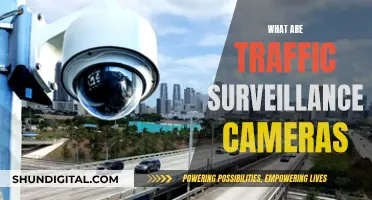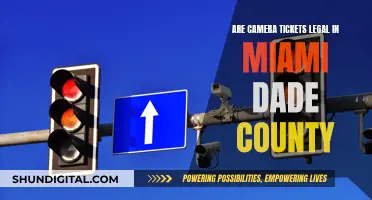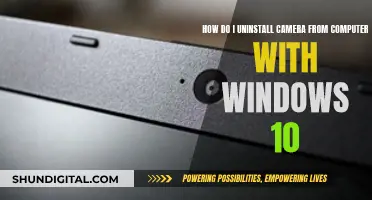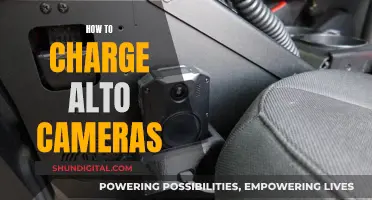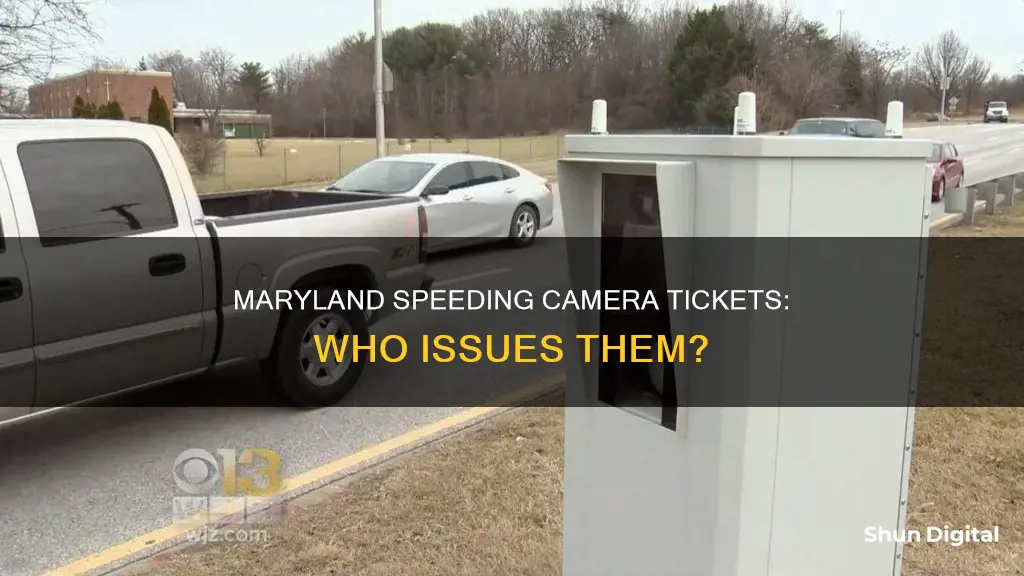
In Maryland, speed cameras are placed in high-risk areas, such as residential areas and school zones, and dangerous intersections, to reduce speeding and promote safer driving. When a vehicle exceeds the speed limit by 12 or more miles per hour, the camera captures a photo, which is then reviewed by a police officer. The registered owner of the vehicle receives a citation, or speeding ticket, by mail, which includes the violation photos and the speed recorded. These tickets are considered civil citations and usually carry a $40 fine, with no points assigned to the driver's record, and insurance providers are not notified. While these tickets can be easily paid online or by mail, individuals also have the option to contest them in court, particularly if they believe they were not at fault or if there were mitigating circumstances.
What You'll Learn

How are speed cameras different from police officers issuing tickets?
Speed cameras are increasingly being used to enforce traffic rules and ensure road safety. They are automated systems that use a camera and a speed measurement device to monitor vehicles exceeding the posted speed limit. On the other hand, police officers use various methods to detect speeding, such as pacing, aircraft speed detection, and radar or laser speed detectors.
One key difference between speed cameras and police officers issuing tickets is the level of automation. Speed cameras operate without the need for human intervention, capturing images of speeding vehicles and automatically generating citations. In contrast, police officers use their judgment and experience to detect speeding vehicles and decide whether to issue a ticket. They may use pacing techniques, where they maintain a constant distance from a suspected speeder to estimate their speed, or rely on technology like radar guns or laser detectors.
Another distinction lies in the process of receiving a citation. With speed cameras, the registered owner of the vehicle receives a citation through the mail, which includes a photograph of the violation. On the other hand, when a police officer issues a ticket, it is typically handed to the driver directly, and the interaction may involve a discussion or negotiation about the violation.
Additionally, the consequences of a speed camera citation versus a police-issued ticket may differ. Speed camera tickets often carry minor penalties, such as small fines, and do not usually affect an individual's driving record or insurance rates. In contrast, a police-issued ticket may result in points being assigned to the driver's license, which can have more significant consequences, such as increased insurance premiums or the requirement to retake driving tests.
It is worth noting that both speed cameras and police officers aim to improve road safety and reduce speeding in high-risk areas. While speed cameras provide an automated and consistent method of enforcement, police officers offer a more flexible and human-centric approach, allowing for discretion and consideration of mitigating circumstances.
In summary, while speed cameras and police officers share the goal of enforcing speeding laws, they differ in terms of automation, citation process, and potential consequences. Understanding these differences can help individuals better navigate the process of receiving and contesting speeding citations.
Zumimall Camera Charging Time: How Long Should You Wait?
You may want to see also

What are the pros and cons of speed cameras?
The use of speed cameras is a highly debated topic. While some people believe that speed cameras can help improve road safety, others argue that they are an invasion of privacy and may not significantly reduce traffic accidents. Here are some of the pros and cons of speed cameras:
Pros of Speed Cameras:
- Improved Road Safety: Speed cameras can encourage drivers to adhere to speed limits, especially in areas with cameras. This can potentially reduce speed-related accidents, making roads safer for drivers, pedestrians, and other road users.
- Deterrent Effect: The awareness of being monitored can influence driver behaviour. Motorists who would otherwise speed may be more cautious and drive within the speed limit, especially in areas with known speed cameras.
- Evidence for Legal Proceedings: Footage from speed cameras can be used as evidence in legal cases, aiding in accident investigations and insurance claims. This can help determine liability and protect drivers from unjust accusations or insurance rate increases.
Cons of Speed Cameras:
- Invasion of Privacy: Some people argue that speed cameras infringe on privacy rights by continuously monitoring individuals' movements without their consent. This data can be vulnerable to misuse or abuse by authorities.
- Unconstitutional Accusation: In the event of a speeding ticket, drivers cannot confront the camera as they would a human accuser, which some believe violates their constitutional rights.
- Sudden Speed Changes and Accidents: The presence of speed cameras may cause some drivers to abruptly slow down or suddenly change lanes, increasing the risk of rear-end collisions and erratic driving.
- Incorrect Readings and False Accusations: Speed cameras are not perfect and can produce incorrect speed measurements, resulting in false accusations and speeding tickets for innocent drivers.
- Profit Motive: Critics argue that the primary motivation for implementing speed cameras is to increase revenue from traffic citations rather than improve road safety.
- Ineffectiveness in Improving Safety: Opponents of speed cameras, such as the National Motorist's Association (NMA), claim that there is insufficient evidence to prove that speed cameras significantly enhance road safety or reduce accidents.
Charging the WASP 4K Camera: A Step-by-Step Guide
You may want to see also

What are the penalties for a speeding camera ticket in Maryland?
In Maryland, speed cameras are used to enforce speed limits and reduce speeding in high-risk areas. These cameras are typically placed in residential areas and school zones where the speed limit is 35 miles per hour or less. The cameras are designed to capture vehicles travelling 12 or more miles per hour over the posted speed limit, and a citation is then issued to the registered owner of the vehicle.
The penalties for a speeding camera ticket in Maryland include a fine of $40 for each violation. These fines can be paid online, in person, or by mail. It's important to note that these types of tickets are considered civil citations, and there are no points assigned to the individual's driver's record or criminal ramifications. However, failure to respond to the ticket or pay the fine can result in additional fees and penalties, including possible suspension of the driver's license.
If an individual chooses to contest the speeding camera ticket, they have the right to do so in court. They can present their case and any mitigating evidence to the judge, who will make a decision. If the individual is not satisfied with the judge's decision, they have 30 days to appeal. It's recommended to consult an attorney when dealing with a speeding camera ticket, as they can assist in mounting a defence and minimizing potential penalties.
In addition to the financial penalties, speeding camera tickets can also have an impact on an individual's driving record. While these tickets do not carry points, paying the fine or pleading guilty will result in the charge becoming part of the individual's driving record. This could potentially increase insurance premiums, as the Maryland Motor Vehicle Administration (MVA) may assess points on the individual's license.
The Highest-Resolution Cameras: Pushing Pixel Boundaries
You may want to see also

How can I dispute a speeding camera ticket in Maryland?
If you've received a speeding camera ticket in Maryland, you may be wondering what to do next. The good news is that you can dispute it, but it is challenging and you may want to hire a traffic violation attorney to assist you. Here is a step-by-step guide on how to dispute a speeding camera ticket in Maryland:
Step 1: Understand the Ticket and Your Rights
When you receive a speeding camera ticket in Maryland, it will include information about the violation and instructions on how to pay the fine or dispute the ticket. It's important to understand the process and your rights.
Step 2: Decide to Dispute
If you choose to dispute the ticket, you must do so within the specified timeframe, typically within 30 days from the date of the citation, to avoid additional penalties or fees.
Step 3: Gather Evidence
Collect any evidence that supports your case, such as photographs of the area where the violation occurred, maintenance records of the speed camera, and statements from any passengers or witnesses.
Step 4: Prepare Documentation
Bring all relevant documentation, such as the ticket itself, your vehicle registration, and any correspondence related to the ticket.
Step 5: Identify Possible Defenses
You can dispute the ticket based on several defenses:
- Challenge the accuracy of the speed camera by requesting maintenance and calibration records.
- Argue that the signage indicating the speed limit or the presence of a speed camera was missing, obscured, or incorrectly placed.
- Provide evidence that the camera captured the wrong vehicle, such as proof that you were not driving in that area at the time.
- Highlight any procedural errors, such as incorrect information on the citation or improper issuance practices.
Step 6: Request a Hearing
You can usually request a hearing by mail, online, or by calling the provided contact number on the ticket.
Step 7: Present Your Case
At the hearing, present your evidence and arguments clearly and concisely. The judge will examine the evidence and listen to both your argument and the prosecution's case.
Step 8: Await the Outcome
Based on the presented evidence, the judge will decide whether to uphold the ticket, reduce the fine, or dismiss the ticket entirely.
Important Considerations:
- Speeding camera tickets in Maryland are typically considered civil violations, and drivers do not receive points on their licenses.
- The standard fine for a speeding camera ticket in Maryland is $40, and it is important to pay on time to avoid substantial increases.
- If you choose not to dispute the ticket, you can pay the fine, plead guilty with an explanation, or request a trial. Paying the fine is considered an admission of guilt.
- If you dispute the ticket and are not satisfied with the judge's decision, you have the right to appeal within 30 days.
Unleash Photography Potential: Always Shoot in RAW
You may want to see also

What are the steps to dispute a speeding camera ticket?
If you believe you weren't speeding, you can dispute a speeding camera ticket in Maryland. However, this can be challenging, so you may want to hire a traffic violation attorney to assist you. Here are the steps to dispute a speeding camera ticket:
Step 1: Receive the Ticket
When you receive a speeding camera ticket in the mail, it will include information about the violation and instructions on how to pay the fine or contest the ticket.
Step 2: Decide to Contest
If you choose to contest the ticket, you must request a hearing. This can usually be done by mail, online, or by calling the provided contact number on the ticket.
Step 3: Act Promptly
Ensure you request a hearing within the specified timeframe, typically within 30 days from the date of the citation, to avoid additional penalties or fees.
Step 4: Gather Evidence
Collect any evidence that supports your case, such as photographs of the area where the violation occurred, maintenance records of the speed camera, and statements from any passengers or witnesses who can corroborate your version of events.
Step 5: Prepare Documentation
Bring all relevant documentation, such as the ticket itself, your vehicle registration, and any correspondence related to the ticket.
Step 6: Challenge the Accuracy of the Camera
You can challenge the accuracy of the speed camera by requesting maintenance and calibration records. If the camera was not properly maintained or calibrated, the recorded speed may be inaccurate.
Step 7: Address Signage Issues
Argue that the speed limit signs were missing, obscured, or incorrectly placed. Take photos to show the current state of the signage and present them at the hearing.
Step 8: Prove Mistaken Identity
If you believe the camera captured the wrong vehicle, gather evidence to support this claim. For example, you can provide proof that you were not driving in that area at the time of the violation.
Step 9: Present Your Case
Prepare a clear and concise presentation of your evidence and arguments for the hearing. Practice your statements to ensure you cover all relevant points effectively.
Step 10: Attend the Hearing
At the hearing, the judge will examine the evidence and listen to both your argument and the prosecution's case. They may ask questions to clarify any points.
Step 11: Await the Outcome
Based on the presented evidence, the judge will decide whether to uphold the ticket, reduce the fine, or dismiss the ticket entirely.
It's important to carefully prepare your case and understand your rights and the legal process when disputing a speeding camera ticket in Maryland. Consulting with a traffic attorney can provide additional support and guidance throughout this process.
Battery Life of 220 Camera: How Long Does It Last?
You may want to see also
Frequently asked questions
Failure to respond to a speeding ticket can result in additional fees and penalties.
The fine for speeding in Maryland is $40 for each violation.
Paying the fine is considered an admission of guilt and will result in the charge becoming a part of your driving record.


